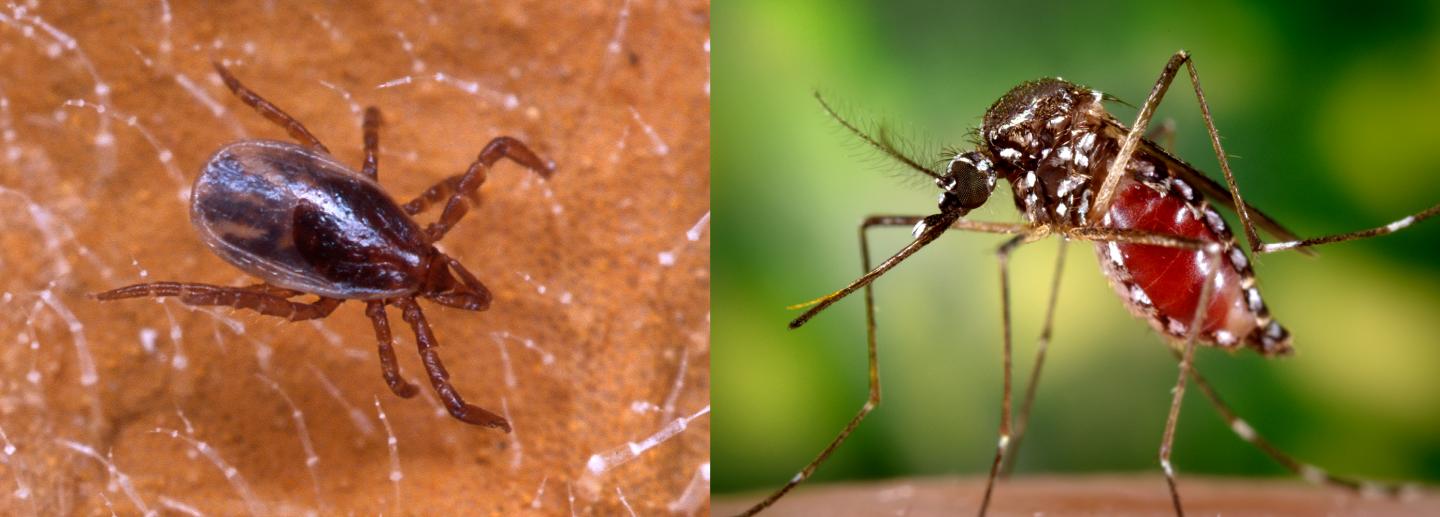Stakeholder group will channel collective action for national vector-borne disease strategy

Credit: (Tick) Scott Bauer, USDA Agricultural Research Service, Bugwood.org; (Mosquito) James Gathany, CDC Public Health Image Library
Annapolis, MD; May 20, 2019–As the incidence of diseases transmitted by ticks and mosquitoes in the U.S. continues to rise, a coordinated and strategic response is needed now more than ever–and a diverse set of organizations are aligning to answer the call.
Under the stewardship of the Entomological Society of America, 18 scientific and medical societies, professional associations, and advocacy groups have formed the Vector-Borne Disease Network, a new coalition that will stand ready to advise and support federal policymakers in confronting the challenge of diseases spread by insects and related arthropods.
These illnesses–such as Lyme disease, Zika, or West Nile virus–are transmitted by vector organisms, primarily blood-feeding insects or arthropods. Vectors ingest disease-causing germs when biting an infected human or animal and later inject them into a new host during a subsequent bite.
Between 2004 and 2016, reported human disease cases in the U.S. resulting from bites from arthropods–primarily ticks and mosquitoes–tripled, according to the U.S. Centers for Disease Control and Prevention (CDC). Meanwhile, nine new germs spread by ticks and mosquitoes were discovered or introduced in that same timeframe. (See CDC Vital Signs, May 2018.) Disease vectors pose significant threats to livestock and companion animals, as well. The underlying causes for these trends are varying and complex, and so are the potential solutions. Thus, the Vector-Borne Disease Network will gather the expertise and perspectives of a variety of stakeholders invested in the mission to reduce the public-health and economic risks posed by ticks and mosquitoes.
The founding members of the Vector-Borne Disease Network are:
- American Mosquito Control Association
- American Society of Tropical Medicine and Hygiene
- Association of Public Health Laboratories
- Association of State and Territorial Health Officials
- Council of State and Territorial Epidemiologists
- Entomological Society of America
- Georgia Mosquito Control Association
- Midwest Center of Excellence for Vector-Borne Disease
- National Association of County and City Health Officials
- National Association of Vector-Borne Control Officials
- National Environmental Health Association
- National Pest Management Association
- Northeast Regional Center for Excellence in Vector-Borne Diseases
- Pacific Southwest Center of Excellence in Vector-Borne Diseases
- Puerto Rico Vector Control Unit
- Society for Vector Ecology
- Southeastern Regional Center of Excellence in Vector-Borne Diseases
- Western Gulf Center of Excellence for Vector-Borne Diseases
“Our country can no longer afford to be complacent toward the dangers posed by mosquito- and tick-borne disease,” says Robert K. D. Peterson, Ph.D., president of the Entomological Society of America (ESA) and professor of entomology at Montana State University. “From researchers and public-health officials to policymakers and vector-management professionals, it’s time to roll up our sleeves and tackle this problem together.”
The Vector-Borne Disease Network’s ultimate goal is to reduce human and animal suffering caused by arthropod disease vectors, and its primary focus will be to collectively advocate for strong, dedicated funding at the federal level for:
- 1. research on tick and mosquito biology, ecology, and disease-transmission risk
2. enhanced tick and mosquito detection and disease diagnosis
3. innovation in disease-prevention and vector-control methods
4. building the nation’s workforce and technical capacity in vector-borne disease research, response, and management.
Stakeholder groups in the Vector-Borne Disease Network are conducting preliminary discussions in 2019 with plans for a coordinated launch of the group’s efforts in late 2019 or early 2020. Additional organizations and nonprofits with related missions are invited to participate. To express interest, contact ESA Director of Strategic Initiatives Chris Stelzig at [email protected].
###
MEDIA CONTACT: Joe Rominiecki, [email protected], 301-731-4535 x3009
ABOUT: ESA is the largest organization in the world serving the professional and scientific needs of entomologists and people in related disciplines. Founded in 1889, ESA today has more than 7,000 members affiliated with educational institutions, health agencies, private industry, and government. Headquartered in Annapolis, Maryland, the Society stands ready as a non-partisan scientific and educational resource for all insect-related topics. For more information, visit http://www.
Media Contact
Joe Rominiecki
[email protected]
Original Source
https:/




